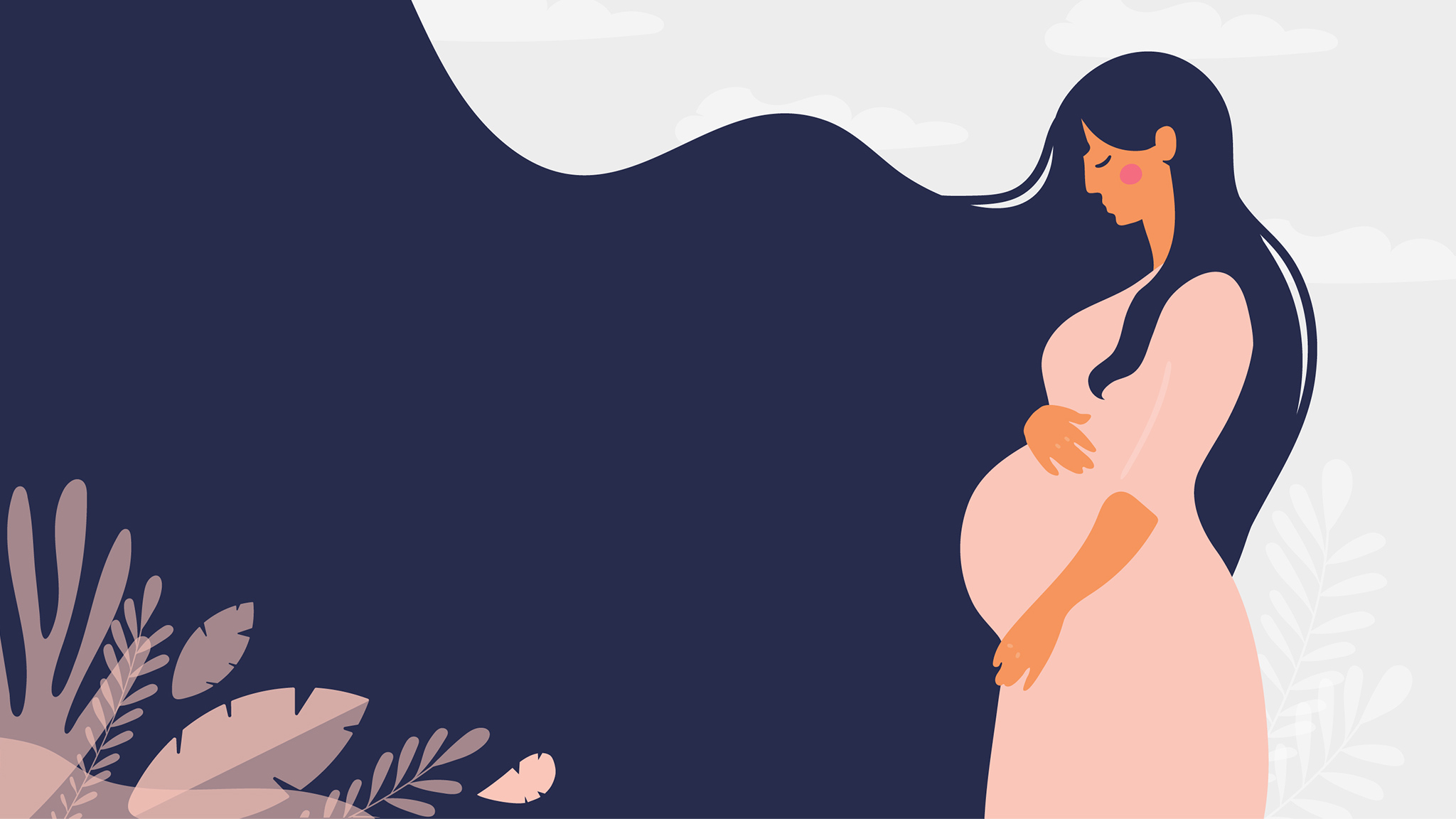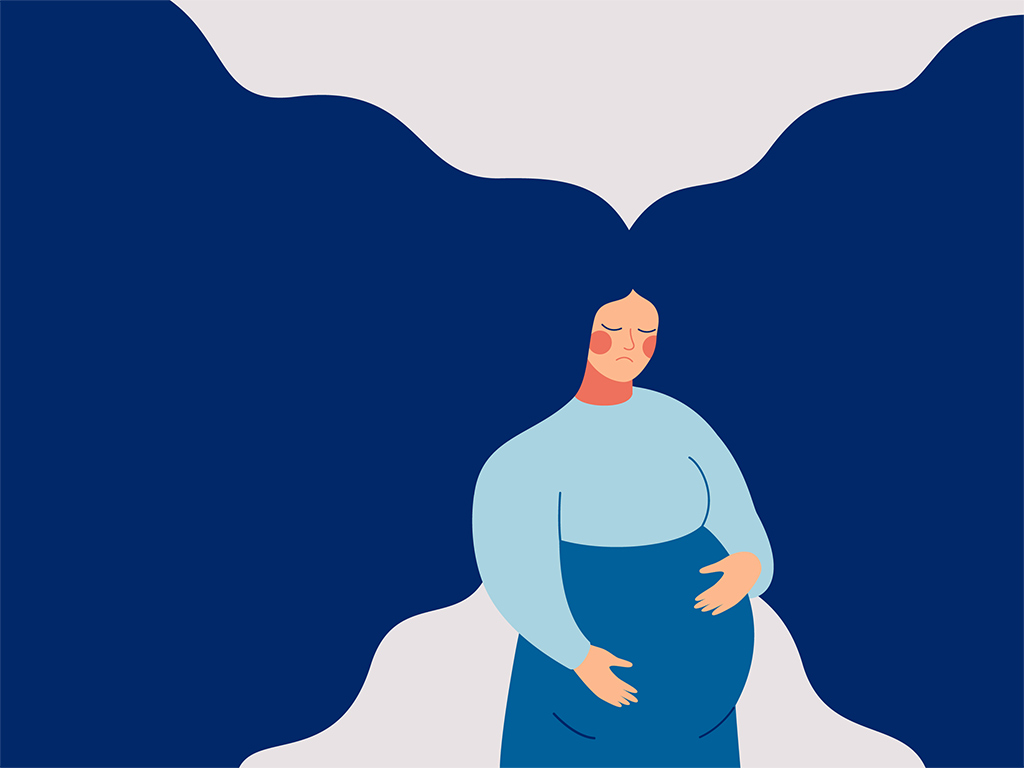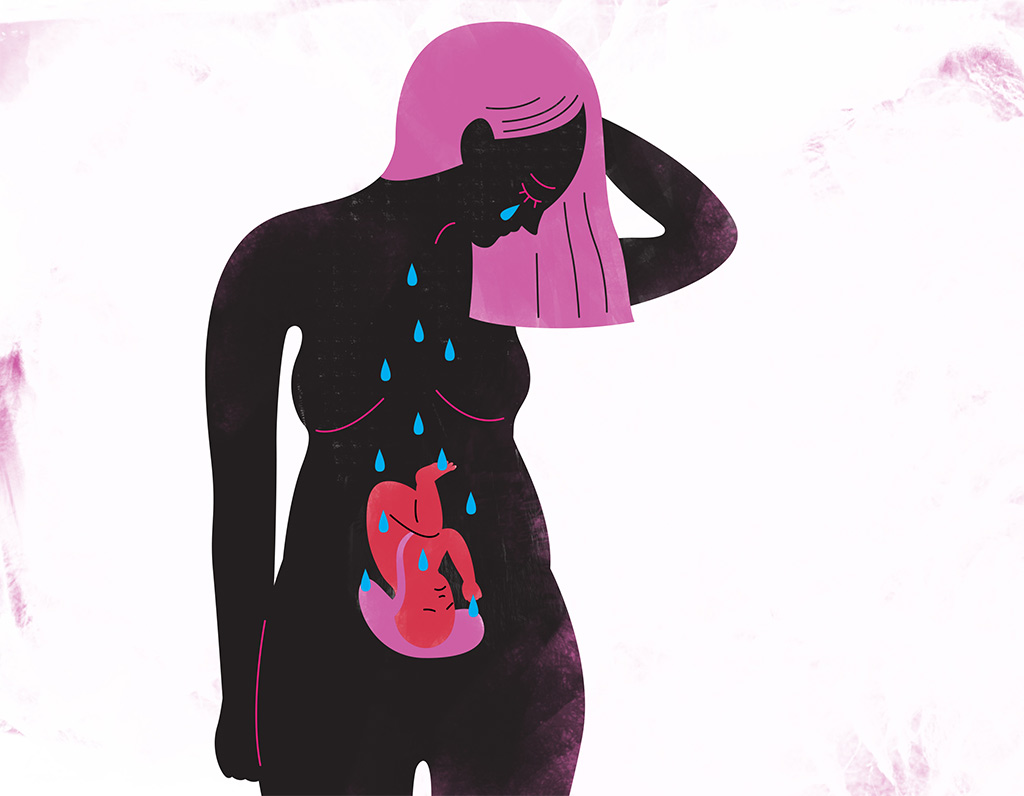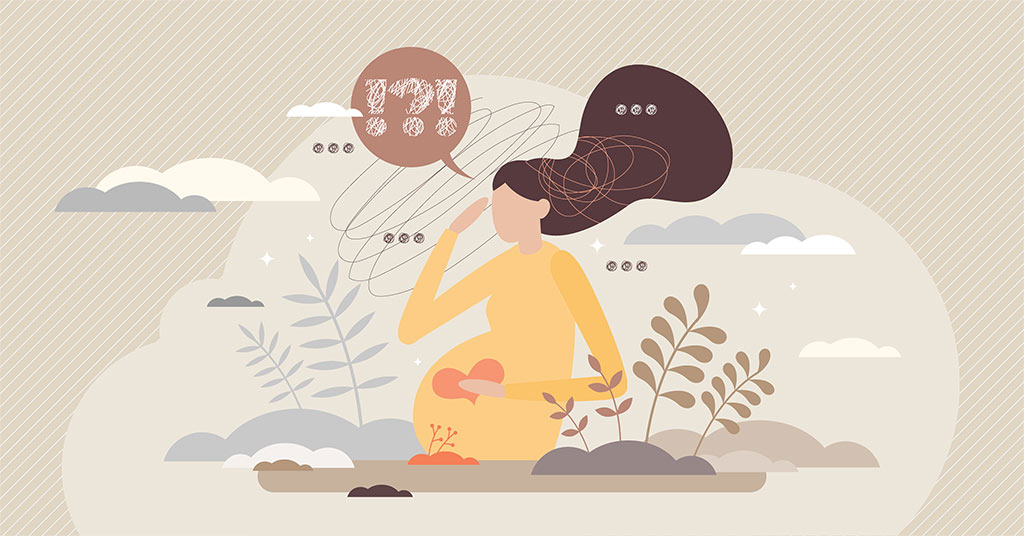How To Cope When Feeling Alone During Pregnancy

There are many reasons why women may experience similar feelings of loneliness or isolation during their pregnancies.
- Feeling overwhelmed during this huge life change, experiencing anxiety about the future, or feeling physically unwell and being unable to spend time with friends and family can all contribute to loneliness in a mom-to-be.
- Depression during pregnancy can result in premature birth, low birth weight, an increased risk of the baby developing respiratory tract infections. or developmental problems in the baby.
- Communication is often the first step in alleviating feelings of loneliness, so talk to friends, family, your partner, or healthcare provider and psychologist if you have one.
Struggling with loneliness or having a mental health crisis?
- Suicide Prevention Lifeline: 1-800-273-TALK (8255); Deaf or hard of hearing dial 711 before the number or connect via online chat
In the first few, nervous weeks of my pregnancy, I didn’t want to tell anyone that I was going to have a baby.
My husband and I had been trying to conceive for a very long time and with fears of a miscarriage buzzing around me like flies, I just didn’t want to talk about it.
I worried that the announcement of my pregnancy would somehow trigger the loss of it.
Although it felt strange to hide such monumental news — even from my closest friends and family — I shut them out intentionally.
I couldn’t stand lying to them, but I also wasn’t ready to share the truth.
The entire situation made me feel very isolated and alone.
Once I got past the first trimester and told everyone about my news, however, my isolation thankfully decreased in tandem.
An unplanned pregnancy, being without a partner (or having an unsupportive one), or feeling physically unwell and unable to socialize can make you feel very alone, as we’ll talk about soon.
Regardless of the root cause, loneliness during pregnancy is a bit precarious because it not only presents a risk to the mother but to the baby, as well.
For this reason, it is important to analyze why you are experiencing it and find the right support to help you through.
In this article, I’ll talk about why women feel lonely during pregnancy, share stories from real moms who have experienced it themselves, and provide valuable insight and advice from women’s health experts on how to cope with pregnancy loneliness.
What Is Pregnancy Loneliness And Why Does It Occur?

Pregnancy loneliness is a feeling of isolation or loneliness occurring in expectant mothers during their pregnancy. It can be a fleeting experience for some and a more chronic issue for others.
For some expectant moms, however, it may last throughout the entire duration or extend into the first stages of motherhood after the child is born. Even if only temporary, loneliness can strike at any stage of a woman’s pregnancy.
Pregnancy loneliness might occur as the result of:
- An unplanned pregnancy
- Hormones
- Guilt
- An unsupportive partner
- The absence of a partner
- Fear of something going wrong
- Feeling unwell
Interestingly, pregnancy loneliness doesn’t just affect mothers who are expecting their first child. It can also occur in those who have been pregnant before.
In this excellent article, journalist Rochaun Meadows-Fernandez describes how she experienced loneliness and depression during her second pregnancy — but not her first.
This was, she believes, due to “thinking of the potential for breastfeeding struggles and how I will manage my workload plus home responsibilities.”
Pregnancy loneliness is often linked to prenatal depression, something that as many as 12.9% of women experience at different trimesters and into their first postpartum year.
The term “prenatal” relates to the period before the birth but during pregnancy, whereas “postpartum” or “postnatal” refers to the time that follows pregnancy and birth.
While postpartum depression refers to depressive symptoms after giving birth, prenatal depression relates to those that arise during pregnancy and before birth.
According to that same study referenced above, as many as 19.2% of women experience a depressive episode within the first three months following delivery.
I spoke with Dr. Sherry A. Ross, a women’s health expert and author of she-ology.
“Feeling lonely in pregnancy is not an unusual feeling and is actually quite common,” she told me.
“Between the hormonal and body changes, lack of support from a partner or family, concerns about being a mother, financial woes and a host of other concerns, feeling lonely is a common feeling.”
I experienced loneliness during my first trimester because I wasn’t communicating with friends and family.
Even though the pregnancy was planned, I felt like I couldn’t discuss it out of fear of something going wrong.
I spoke to Dr. Anastasia Parsons, a New York-based psychologist who specializes in family therapy.
She agreed that the first trimester can be a difficult time for pregnant women who don’t want to share their news yet.
“In family psychology, it is common knowledge that ‘secrets’ within a family can be extremely toxic, particularly for the person/people carrying the burden of holding the secret,” she told me.
Dr. Parsons continued:
“Couple that burden of carrying the secret of being pregnant with the uncertainty in the first trimester due to risk of miscarriage, and add on pregnancy hormones, and I could see that being especially difficult for someone who is unable to share their news with their support system or someone who doesn’t have a strong support system in the first place.”
A friend of mine said that keeping her news a secret wasn’t the problem; the whole experience of impending motherhood overwhelmed her, which ultimately led to feelings of isolation.
“I was so preoccupied by the pregnancy,” she told me. “It was all I could think about. I didn’t think any of my friends, many of whom didn’t have children, would understand and therefore I didn’t talk to them about it.”
“I stopped answering their calls. I thought they would think I was boring if all I talked about was being pregnant because that’s all I wanted to talk about. Nothing else seemed to matter.”
“Your body is changing,” she explained. “And no one can understand that unless they are also pregnant or have been pregnant. My friends without kids don’t want to talk about my nipples changing color!”
Another friend of mine described losing her identity during her pregnancy.
“I suddenly didn’t know who I was anymore. I couldn’t go out drinking and dancing anymore, things I loved doing. And yet, I wasn’t a mom just yet. I felt completely in limbo. I was terrified that I had lost the old me but didn’t know how to be the new me. It was very isolating.”
I could wholeheartedly relate to this feeling of not having a “tribe” while I was pregnant.
When you’re pregnant, you feel like you are neither here nor there.
You’re not yet a mother who is going to baby groups and breastfeeding circles with your baby in tow.
But at the same time, you’re also not doing the things you would normally do with your friends before you got pregnant.
When I found out I was going to have a baby, I quickly joined several Facebook groups of expectant mothers in Manhattan to find other women who were in the same boat as me.
Finding a “tribe” of this nature can help to alleviate your feelings of loneliness while you’re pregnant.
Another important factor to consider in understanding feeling alone while pregnant is that many women just feel physically awful during pregnancy.
Morning sickness, dizziness, shortness-of-breath, heartburn, cramps, terrible nightmares, and exhaustion are just a few of the many symptoms pregnant women experience.
Getting through a day at work seems hard enough on its own, let alone meeting up with friends and family during the evenings or over the weekend.
I was so tired during the first trimester of my pregnancy, it was all I could do to get through to 6 PM when I would crawl home and pass out on the couch.
If I hadn’t shared a home with my husband, I wouldn’t have seen anyone other than my colleagues for weeks.
And because I didn’t share the news of my pregnancy at work, I wouldn’t have been able to talk to anyone about my feelings at all.
So for pregnant women without a partnership and who aren’t yet ready to share the news about their pregnancy, the first trimester can be an extremely lonely time.
Dr. Ross, the women’s health expert I spoke with, said that feelings of loneliness can be worse for those who are carrying an unplanned pregnancy.
“Fifty percent of pregnancies are unplanned,” she explained, adding:
“The excitement of pregnancy can be complicated by confusion and loneliness if the pregnancy was not planned or expected. It’s a tremendous change for women and couples and if it wasn’t a planned pregnancy it can even feel lonelier.”
And sadly, some women who are in a relationship don’t receive the support they need from their partner — who may not approve of the pregnancy.
In situations such as this, women feel like they can’t even approach their partner to discuss their feelings of isolation, only making their situational loneliness worse.
Finally, and this is certainly something that I experienced during my pregnancy, there is a sense of guilt associated with carrying a child.
I have so many friends who are struggling to conceive.
It felt impossible to talk to them about my feelings of loneliness when I knew that all they wanted was to become pregnant themselves.
I didn’t feel as though I had any right to be anything other than overjoyed about becoming a mother, so I couldn’t share my true feelings with any of them.
Pregnancy loneliness can strike at any time during a woman’s pregnancy.
Unplanned pregnancies may also be very isolating, especially if a woman doesn’t have a partner to support her. Some women will avoid talking about their pregnancy with friends who are still trying to conceive a child themselves.
What Are The Risks Associated With Pregnancy Loneliness?

Loneliness can be upsetting and harmful during the best of times but it could potentially be more damaging for pregnant women, as the baby may also be affected.
As I mentioned earlier, loneliness during pregnancy is linked to prenatal depression and the two often go hand in hand.
Dr. Ross, the author of she-ology, said, “Feeling lonely in pregnancy can lead to depression and anxiety.” She continued:
“Feeling lonely often leads to depression. Symptoms include fatigue, irritability, poor appetite, insomnia, preterm labor, preeclampsia, alcohol, drug, and tobacco use which could lead to [the mother] not taking proper care of herself and the baby during pregnancy.
Untreated depression and loneliness in pregnancy puts women at a much greater risk of postpartum depression and healthy bonding with her newborn.”
According to an article from The American Pregnancy Association, untreated depression in pregnant women can lead to poor nutrition, substance abuse, and suicidal behavior.
These actions can cause premature birth, low birth weight, and developmental problems in the baby.
They also reported that “babies born to mothers who are depressed may be less active, show less attention and be more agitated than babies born to moms who are not depressed.”
I spoke to Dr. Drai, one of the country’s leading physicians in women’s health. He agreed that loneliness and depression are often intertwined with one another, saying:
“Feeling lonely can be linked to depression. Risks for depression in pregnancy include anxiety, stress, a history of depression, poor support system, unintended pregnancy, or physical or emotional abuse from your partner.
Symptoms of depression include changes in eating habits, sadness, not being able to concentrate, changes in sleep patterns, feelings of guilt, anxiety, loss of interest in what you loved before, or feelings of taking your life which poses a great risk to your unborn child.”
According to this 2018 study, depression and loneliness during pregnancy may lead to more respiratory tract infections in the child.
For both the sake of the mother and the health of the baby, it is important for women who are struggling with loneliness during their pregnancy to seek help when they need it.
Feeling alone while pregnant can lead to depression, which can be harmful to both the mother and the baby.
What Can You Do To Alleviate Feelings Of Loneliness During Pregnancy?

Like all forms of loneliness, communication is often extremely helpful in alleviating feelings of isolation.
When I finally spoke to my family and friends and met some other moms-to-be, I felt much less alone during my pregnancy.
My advice is to talk to those around you — your partner if you have one, friends, family, or even a healthcare provider — and share your feelings openly.
If you don’t have a partner, it might be helpful to join a local pregnancy support or exercise group.
As hard as it can seem when you’re struggling with loneliness and feelings of depression, it helps to be proactive about it and there are several things you can do.
- Try group exercise for expectant mothers.
I attended pregnancy yoga classes. This was a great way to meet other moms-to-be and talk about our feelings in a relaxed and informal way.
A friend of mine joined a pregnancy fitness class called Baby Body Barre that she loved.
“It was something I did every week where I could really connect with my body, enjoy feeling pregnant, and talk to other pregnant women. I met friends there who I still see all the time,” she explained.
There are plenty of fitness and exercise classes tailor-made for pregnant women that provide ample opportunity to meet like-minded women.
Not only that, but exercise is a great way to beat feelings of depression and loneliness.
- Seek online resources at home.
If in-person groups aren’t really your thing, that’s okay — there are some fantastic resources available online.
You could try listening to a pregnancy podcast like Preggie Pals, which features a panel of women at various stages of pregnancy, medical professionals, and experienced moms.
There is also a really helpful YouTube channel called What To Expect that lets you watch what is happening during each week of your pregnancy.
In that same vein, I downloaded an app called The Bump during my pregnancy. It lets you track your baby’s development week by week and offers great tips and information from other pregnant women and moms.
You might also watch television shows about pregnancy and childbirth if you’re apprehensive about giving birth.
I love a British TV show called One Born Every Minute and binge-watched it during my pregnancy. Seeing others experience childbirth helped me to prepare for my own.
- Interact with your baby.
Once you begin to feel your baby moving around inside you, that’s when it starts to hit home that you’re not really on your own anymore.
To feel less alone, do things that make your baby react to you — or even interact with you.
You could try singing to your bump, having a warm bath “together” or reading out loud. Your baby will love hearing your voice and it’s a nice way to bond before birth.
The Roots Of Loneliness Project’s Editor-In-Chief, Alison Huff, said that she used a remote control to interact with her baby — really. She explained:
“My first daughter was a kicker, one who would react to any pressure against my belly. I would sit back on the couch and balance the remote on top of my baby bump, just to watch it move every time she’d nudge it from within.
Sometimes I would use a finger to lightly poke different areas of my ginormous belly, just to feel her push back against me. It might sound silly, but it was like we were playfully letting each other know that we were there.”
Another fun activity that will help you to connect with your bump is belly painting, an activity that allows you to decorate your baby bump alongside other pregnant women.
Not only is it a nice way to spend an afternoon, but keepsake photos of the finished artwork will be a treasured memory for all time.
- Find support wherever you can.
Dr. Parsons, the New York-based psychologist who specializes in family therapy, offered some additional advice, as well.
“Seek support,” she said. “Whether that be through seeing a qualified mental health professional or through talking to family and friends. You do not need to suffer or grin and bear it.”
“Consider what is best for YOU, not necessarily what is the societal norm,” she continued, adding:
“In the past, it has been seen as taboo for women to share news of their pregnancies before the end of the first trimester, but having one blanket way of doing things is simply not the right thing for everyone.”
I asked Dr. Drai, one of the country’s leading physicians in women’s health, what advice he could offer to pregnant women who are suffering from loneliness.
“If you are feeling lonely, join a pregnancy support group,” he said. “If those feelings won’t go away, reach out to your OBGYN. You may be experiencing depression. Remember you are not alone.”
If you feel like your mental health is deteriorating or your depression is worsening, it might be safe to take antidepressants if that’s what your doctor advises, although there may be a small risk to the baby.
According to the American Pregnancy Association:
“If medication seems like the best treatment for your depression, forming a collaborative treatment team is the best course of action. This would include your prenatal care provider and your mental health provider.”
That said, don’t discount natural remedies, especially if you’re leery of taking medication while pregnant.
The American Pregnancy Association advises that there are many natural ways to treat loneliness and depression during pregnancy.
- Get enough exercise: Exercise may naturally increase serotonin and dopamine levels in your body, offering a mental health boost.
- Take time to rest: Getting enough sleep can improve your mood and helps the mind deal with stress.
- Watch your diet: Foods containing caffeine, sugar, processed carbohydrates and artificial additives can negatively impact your mood and mental clarity.
- Consider acupuncture: According to this study, acupuncture from a licensed acupuncturist specializing in pregnancy acupuncture can be highly effective in treating depression in pregnant women. It may also help with morning sickness.
- Try light-therapy. According to this study, pregnant women suffering from depression who were given 3 to 6 weeks of light therapy had improved symptoms
Group exercise, online resources, and even interacting with your baby can also make you feel less alone.
Antidepressants could be helpful for very severe cases of prenatal depression, but those can potentially harm the baby and should only be taken under a physician’s care.
Natural treatments can include exercise, a balanced diet, rest, light therapy, or acupuncture.
Closing Thoughts
Feeling lonely during pregnancy is a strange concept when you consider that you are never truly alone while pregnant; you are growing another human inside you!
But it is important to address loneliness during pregnancy — perhaps more than during any other time in your life — because these feelings not only impact you but your baby, as well.
So find support, help, and reassurance wherever you can.
Being pregnant and feeling alone does not mean that you are going to be a bad mother.
Addressing the situation by seeking help or support means that you are doing the right thing for yourself and your baby — and that makes you a great mother.
Editor’s Note: This article is part of The Roots Of Loneliness Project, the first-of-its-kind resource that comprehensively explores the phenomenon of loneliness and over 100 types we might experience during our lives.
Find Help Now
If you’re struggling with pregnancy loneliness, we’ve put together resources to meet you wherever you are — whether you want someone to talk to right now, or are looking for longer-term ways to help ease your loneliness.
- Suicide Prevention Lifeline: 1-800-273-TALK (8255); Deaf or hard of hearing dial 711 before the number or connect via online chat
- Resources & Emotional Support For Loneliness
- Volunteer & Pet Adoption Opportunities






